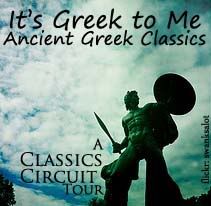This is my post for the Classics Circuit Ancient Greece Tour (The full schedule can be found at the tour web page).
 |
| "And deep beneath the Maenad cry His proud voice rings: "Come, O ye Bacchae, come!" |
My comments here will not be at all a general summing up of the play just a few sort of random observations stimulated by my reading. (Wikipedia has good articles on Euripides (480 to 406-Athens) and The Bacchae.)
My first question as I read the play (read via Dailylit.com) was am I really having a reading experience anything like that of reading it in the original or am I reading an early 20th century English drama inspired by a Greek Drama? The translator, Gilbert Murray (1866 to 1957) was born and spent his early years in New South Wales Australia. At age 11 Murray's father died and he and his mother emigrated to the UK. Murray studied the classics at Oxford. He translated many classic Greek Dramas. Most English speaking non Ancient Greek readers up until 1965 or so got there Greek Drama from Murray. Sometimes people used to say that Constant Garnett made all of the great Russian writers sound the same. Some say Murray did did the same thing to Greek Drama. My conclusion here is I read more a early post-Victorian drama based on Greek roots than a Greek Drama. My feeling on this is hard to explain or justify. When I read the translations of Homer by Robert Fagles I felt I was reading a very old work. I did not feel that way when I read this work.
Another Maiden_
Then streams the earth with milk, yea, streams
With wine and nectar of the bee,
And through the air dim perfume steams
Of Syrian frankincense; and He,
Our leader, from his thyrsus spray
A torchlight tosses high and higher,
A torchlight like a beacon-fire,
To waken all that faint and stray;
And sets them leaping as he sings,
His tresses rippling to the sky,
And deep beneath the Maenad cry
His proud voice rings:
"Come, O ye Bacchae, come!"
Are you a fan of the cable TV series True Blood? I admit I am and I am looking forward to the next season. The character in the series "Mary Anne" was a Maenad. Maenads were the hand maidens of the God Dionysus. In Euripides play Dionysus is a God who allows us to celebrate our irrational side, to give play to our darker less civilized instincts. He is surrounded by a group of female followers who worship him. Of course there are themes here suggesting Dionysus is to be taken as an eastern cult religion attempting to subvert the rational codes of the Greek and that the Maenads represent a latent fear of uncontrolled female impulses.
I thank Rebecca for her hard work in hosting the classics circuit. I know my post is a bit unorthodox.
Mel u





10 comments:
Fundamentally, more contemporary translations have the same problem. Modernist poets create Modernist translations. They probably are closer to the Greek along certain dimensions, but I'll bet Murray is closer in some ways that contemporary translators miss.
Or, a hundred years from now, readers used to a different poetic idiom will look at our translations and think, oh, that old Modernist stuff!
The short lines keep the Murray translation readable. I thought the rhyming couplets might be monotonous, but the bit you posted is springy and energetic.
Amateur Reader-very good comment and no doubt you are correct-
That's funny you compare The Bacchae (which I haven't yet read) to True Blood. I haven't yet seen the most recent season, but it is a fun show! Maryanne was so so so crazy.
Well, it's comforting in a way to know that problems of translation transcend millenia as well as decades or centuries...I've not read "The Bacchae" but you do a good job by it, because you've made me curious. Thank you.
I loved your connection to True Blood, definitely peaked my interest!
libellulebooks-Yes MaryAnne was a fun character but it got to be time to move on!
Ash-thanks!
ds-thanks as always for your comments
I read a lot of Greek drama in college, but missed this one. You make it seem very interesting!
sorry the translation was distracting you. AR has an interesting point. I think it would a nice thing to be able to compare the translations--too bad that's not an option for you!
Thanks for participating in the Circuit.
Connolly-Ahern-thanks very much for your kind words
Rebecca Reid-well I did read Greek Drama as read by lots of modern authors so it is valuable itself and as Amateur Reader said-one day the translations of today will be replaced
Translations really can make or break a work. I hope you get to read another translation that compares better! :)
Post a Comment